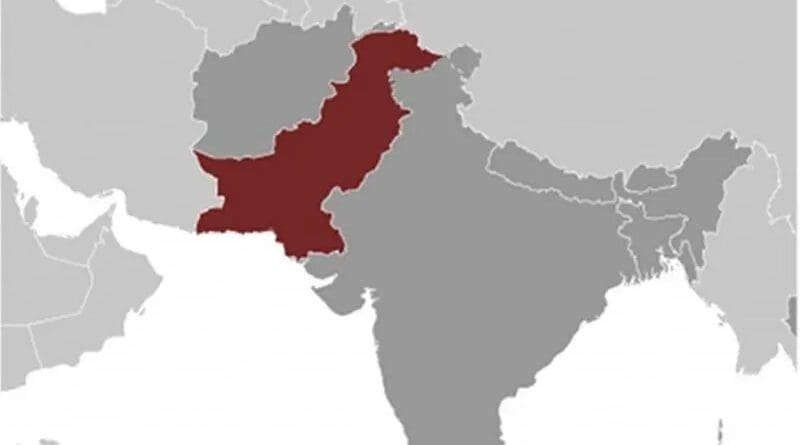Pakistan Detains 44 JeM Suspects Amid Tensions With India
By BenarNews
By Jaishree Balasubramanian
Pakistan said Tuesday it had detained 44 Jaish-e-Muhammad militants, a week after warplanes from India targeted a suspected JeM camp in Pakistani territory to retaliate for a car-bombing that killed dozens of Indian troops in the disputed Kashmir region.
The climate between the two nuclear-armed neighbors has settled into an “uneasy pause” after last week’s airstrike and a subsequent military standoff had died down, according to analysts. During the standoff both militaries exchanged artillery gunfire across their respective borders in Kashmir, and a dogfight between the two air forces led to the capture by Pakistanis of an Indian pilot who was freed on Friday.
India’s aerial bombing of the camp had eliminated a large number of JeM militants, Indian officials had said a week ago, while Pakistan had countered that there were no casualties in the Feb. 26 airstrike. India launched that operation in the aftermath of a Feb. 14 suicide bombing, which was claimed by Pakistan-based JeM and killed 40 Indian troops in Pulwama, a district of Indian Kashmir.
Since then, at least 30 people have died in insurgency-related violence on the Indian side of the Himalayan region, authorities said.
“There is an uneasy pause in the Indo-Pak tense relationship. Pakistan has not taken any substantive steps toward shutting down terror camps operating on its soil. Any further terror attack or provocation from Pakistan is bound to evoke a strong response,” Anil Wadhwa, a senior scholar at the Vivekananda International Foundation, an Indian think-tank, told BenarNews.
On Tuesday Indian opposition parties clamored for proof from the ruling party that the airstrike had destroyed the JeM camp.
Indian Home Minister Rajnath Singh said the death toll in the aerial bombing would be known “today or tomorrow.”
On Monday, Amit Shah, the president of the ruling Bharatiya Janata Party (BJP), claimed that at least 250 suspected JeM militants were killed in the attack.
However, that same day Indian Air Chief Marshal B.S. Dhanoa maintained that his country’s warplanes had successfully leveled the JeM camp, but he declined to talk about the number of militants killed.
“We hit our targets. We don’t count human casualties, the government does that,” Dhanoa said.
‘We are investigating them’
In Pakistan, news reports quoted Shehryar Khan Afridi, the Pakistani state minister for the interior, as saying that Mufti Abdur Rauf, the brother of JeM chief Masood Azhar, was among the 44 suspected JeM members rounded up by local authorities on Tuesday.
He told a press conference in Islamabad that a dossier shared by India with Pakistan last week had contained Rauf’s name. Another detained suspect was identified as Hammad Azhar, whose name was in the dossier too, the minister said, the Press Trust of India news agency reported from Islamabad.
“We are investigating them and if we get more evidence, more proof against them, they will be proceeded against according to law and if we don’t get any proof their detention will end,” the Reuters news agency quoted the minister as saying.
New Delhi has blamed Pakistan for harboring and supporting JeM militants in targeting India in attacks, including the Feb. 14 suicide bombing, an allegation that Islamabad has continued to reject.
In Delhi on Tuesday, India’s navy chief told an annual conference of the Indo-Pacific Regional Dialogue that last month’s attack was “aided by a state” that sought to destabilize India.
“We also have reports of terrorists being trained to carry out operations in various modus operandi, including through the medium of the sea,” Chief Admiral Sunil Lanba told the meeting. It was attended by officials from Australia, Bangladesh, Canada, China, Indonesia, Israel, Japan, Seychelles, Singapore, South Korea, Sri Lanka, Britain and the United States.
Kashmir, which both India and Pakistan claim in its entirety, has grappled with a separatist insurgency on the Indian side that has killed at least 70,000 people since the late 1980s. The neighbors have gone to war over Kashmir twice in their 72-year history – in 1965 and 1998.
Indo-Pakistani tensions remain high although the standoff eased at the end of last week, according to another analyst.
“Neither side seems to have changed its orientation after the release of the Indian pilot. Now both countries are reportedly showing more aggressive posturing on the naval front as well as they test each other’s limits,” security analyst Ajai Sahni told BenarNews.
“Confrontation was earlier restricted to ground forces along the border but after the terror attacks, there are chances of confrontation between naval and air forces also. I don’t think there will be a let-up in tensions between the two sides, at least in the near future or until general elections in India are over,” he added.
General elections are scheduled to be held before May.
Mohammad Amin Pirzada contributed to this report from Srinagar, India.

